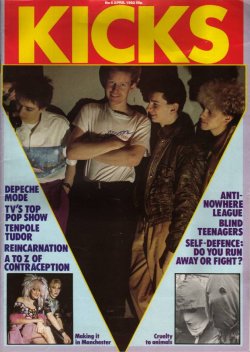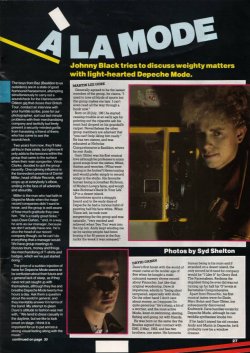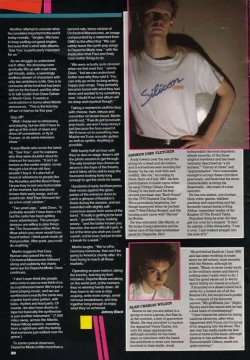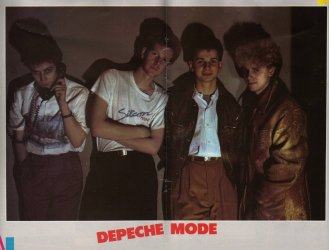A La Mode
[Kicks, 6th April 1982. Words: Johnny Black. Pictures: Syd Shelton.]




A LA MODE
The boys from Baz (Basildon to us outsiders) are in a state of good humoured harassment, attempting to carry out a soundcheck for the Hammersmith Odeon gig that closes their British Tour, conduct an interview with your humble scribe, pose for our photographer, sort out last minute problems with their merchandising company and tactfully but firmly prevent a security-minded gorilla from harassing a friend of theirs who has come to see the soundcheck.
Two years from now, they’ll take all this in their stride, but right now it only adds to the tensions within the group that came to the surface when their main songwriter, Vince Clarke, decided to quit the group recently. One calming influence is the benevolent presence of Daniel Miller, head of Mute Records, who crops up at everybody’s elbow, smiling in the face of all adversity and absurdity.
Miller is the man who had faith in Depeche Mode when the major record companies didn’t want to know, and the group is well aware of how much gratitude they owe him. “He’s a really great bloke,” says Dave Gahan, “and, in a way, he acts as our manager, because we don’t actually have one. He’s also the head of our record company though, so he can’t do everything that a manager would. We have group meetings to discuss tours, money and things like merchandising of T-shirts and badges, which we’ve just started doing.”
The price of a sudden injection of fame for Depeche Mode seems to be confusion about their future and a general lack of sleep, as if they have not yet caught up with themselves, although they live and breathe Depeche Mode twenty five hours a day. Ask them a question about the world in general, and they inevitably answer in terms of the band. My attempt to glean Dave’s attitude to fashion was met with, “We tend to dress casually in the daytime, but we like to look smart on stage. I think it is important for us to put across a strong visual feeling along with the music.”
Another attempt to uncover what he considers important in the world today reveals, “Singles. We have to keep putting out singles, because that’s what sells albums. ‘See You’ is particularly important for us.”
As we struggle to understand each other, the dressing room gradually fills up with road crew, girl friends, aides, a seemingly endless stream of characters with only two ambitions in life. One is to consume all the food that has been laid on for the band, and the other is to talk louder than Dave Gahan or Martin Gore. It seems a contradiction in terms when Martin announces, “This is the first day off we’ve had so far this year.”
Day off?
“Well, I know we’re rehearsing and playing, but we didn’t have to get up at the crack of dawn and drive off somewhere, or fly to Europe, or do some television show.”
It was Martin who wrote the latest hit, ‘See You’, and he explains why they were doubtful about its chances for success. “It isn’t as instant as the earlier singles, so we thought a lot of our old fans wouldn’t buy it. It’s also full of musical references to people like the Ronettes and the Beach Boys. I know they’re not very fashionable at the moment, but everybody knows their earlier songs, and we used to do ‘And Then I Kissed Her’ as a live cover version.”
“Two years ago,” adds Dave, “it probably wouldn’t have been a hit, but the radio has been getting more adventurous. The younger deejays are willing to play things like The Associates or Bow Wow Wow which you never would have heard before. I think punk made all that possible. After punk, you could do anything.”
Martin suggests that Gary Numan also paved the way, Orchestral Manoeuvres followed along and suddenly the charts were ripe for Depeche Mode. Dave continues,
“I don’t even think the people who come to see us now think of us as a synthesiser band. We’re just a band playing music, and we use synthesisers exactly the same way a guitar band uses guitars, with bass, rhythm and lead parts. Of course, we also have drums on tape but basically the synthesiser is just another instrument.” (7,000 miles away, across the Atlantic, Robert Moog wakens, sweating, from a nightmare with the feeling that someone just walked over his grave.)
To some cynical observers, Depeche Mode is little more than a second rate, teeny version of Orchestral Manoeuvres, an image compounded by a statement from OMD to the effect that “We can safely leave the synth-pop songs to Depeche Mode now,” with the implication that Paul and Andy have better things to do.
“We were actually quite pleased when we first read that,” admits Dave, “but we can understand better now why they said it. You can only go on for so long writing happy pop songs. They probably became bored with what they had done and wanted to try something new. I doubt if our next album will be deep and mystical though.”
Taking a moment to stuff his face with cheese, ham, lettuce and cucumber on brown bread, Martin points out, “If we do get bored with pop music, we won’t keep doing it just because the fans expect it. We’ll move on to something new. Maybe we’ll use acoustic guitars as well as synths. Anything is possible.”
With barely half an hour until they’re due on stage, there’s still the photo session to get through. The wily lensman has chosen an alcove in the foyer of the theatre, and it takes all his skill to keep the foursome looking lively long enough to get the shots he needs.
Hundreds of early-bird fans press their noses against the glass Panes of the entrance doors to catch a glimpse of Basildon’s finest during the session, and are rewarded with slightly self-conscious waves from some of the band. “It really is getting to be hard work,” grumbles Dave, looking weary, “and the better known you become, the more difficult it gets. A lot of the time you wish you could vanish, not for ever, but just to take a break for a week.”
Martin laughs. “We’re off to Germany tomorrow, then we’ll be going to America shortly after. It’s hard trying to reach all these markets.”
Operating on pure instinct, taking the knocks, learning by their mistakes, Depeche Mode are taking on the world and, at the moment, they’re winning hands down. All they have to do now is stop arguing, write more songs, avoid nervous breakdowns, and stay together long enough to enjoy what they’ve achieved.
[Kicks, 6th April 1982. Words: Johnny Black. Pictures: Syd Shelton.]
Interview with Dave and Martin backstage during the "See You" Tour, where the band are tired but steaming doggedly on through a gruelling schedule. They talk about their routine as well as where their musical style may go as the criticisms of being too poppy and lightweight were just beginning to set in. The personal profiles of each band member, including Alan, are amongst the most cringeable on record.
" Ask them a question about the world in general, and they inevitably answer in terms of the band. My attempt to glean Dave’s attitude to fashion was met with, “We tend to dress casually in the daytime, but we like to look smart on stage. I think it is important for us to put across a strong visual feeling along with the music.” "
Summary: Interview with Dave and Martin backstage during the "See You" Tour, where the band are tired but steaming doggedly on through a gruelling schedule. They talk about their routine as well as where their musical style may go as the criticisms of being too poppy and lightweight were just beginning to set in. The personal profiles of each band member, including Alan, are amongst the most cringeable on record. [1994 words]




A LA MODE
The boys from Baz (Basildon to us outsiders) are in a state of good humoured harassment, attempting to carry out a soundcheck for the Hammersmith Odeon gig that closes their British Tour, conduct an interview with your humble scribe, pose for our photographer, sort out last minute problems with their merchandising company and tactfully but firmly prevent a security-minded gorilla from harassing a friend of theirs who has come to see the soundcheck.
Two years from now, they’ll take all this in their stride, but right now it only adds to the tensions within the group that came to the surface when their main songwriter, Vince Clarke, decided to quit the group recently. One calming influence is the benevolent presence of Daniel Miller, head of Mute Records, who crops up at everybody’s elbow, smiling in the face of all adversity and absurdity.
Miller is the man who had faith in Depeche Mode when the major record companies didn’t want to know, and the group is well aware of how much gratitude they owe him. “He’s a really great bloke,” says Dave Gahan, “and, in a way, he acts as our manager, because we don’t actually have one. He’s also the head of our record company though, so he can’t do everything that a manager would. We have group meetings to discuss tours, money and things like merchandising of T-shirts and badges, which we’ve just started doing.”
The price of a sudden injection of fame for Depeche Mode seems to be confusion about their future and a general lack of sleep, as if they have not yet caught up with themselves, although they live and breathe Depeche Mode twenty five hours a day. Ask them a question about the world in general, and they inevitably answer in terms of the band. My attempt to glean Dave’s attitude to fashion was met with, “We tend to dress casually in the daytime, but we like to look smart on stage. I think it is important for us to put across a strong visual feeling along with the music.”
Another attempt to uncover what he considers important in the world today reveals, “Singles. We have to keep putting out singles, because that’s what sells albums. ‘See You’ is particularly important for us.”
As we struggle to understand each other, the dressing room gradually fills up with road crew, girl friends, aides, a seemingly endless stream of characters with only two ambitions in life. One is to consume all the food that has been laid on for the band, and the other is to talk louder than Dave Gahan or Martin Gore. It seems a contradiction in terms when Martin announces, “This is the first day off we’ve had so far this year.”
Day off?
“Well, I know we’re rehearsing and playing, but we didn’t have to get up at the crack of dawn and drive off somewhere, or fly to Europe, or do some television show.”
It was Martin who wrote the latest hit, ‘See You’, and he explains why they were doubtful about its chances for success. “It isn’t as instant as the earlier singles, so we thought a lot of our old fans wouldn’t buy it. It’s also full of musical references to people like the Ronettes and the Beach Boys. I know they’re not very fashionable at the moment, but everybody knows their earlier songs, and we used to do ‘And Then I Kissed Her’ as a live cover version.”
“Two years ago,” adds Dave, “it probably wouldn’t have been a hit, but the radio has been getting more adventurous. The younger deejays are willing to play things like The Associates or Bow Wow Wow which you never would have heard before. I think punk made all that possible. After punk, you could do anything.”
Martin suggests that Gary Numan also paved the way, Orchestral Manoeuvres followed along and suddenly the charts were ripe for Depeche Mode. Dave continues,
“I don’t even think the people who come to see us now think of us as a synthesiser band. We’re just a band playing music, and we use synthesisers exactly the same way a guitar band uses guitars, with bass, rhythm and lead parts. Of course, we also have drums on tape but basically the synthesiser is just another instrument.” (7,000 miles away, across the Atlantic, Robert Moog wakens, sweating, from a nightmare with the feeling that someone just walked over his grave.)
To some cynical observers, Depeche Mode is little more than a second rate, teeny version of Orchestral Manoeuvres, an image compounded by a statement from OMD to the effect that “We can safely leave the synth-pop songs to Depeche Mode now,” with the implication that Paul and Andy have better things to do.
“We were actually quite pleased when we first read that,” admits Dave, “but we can understand better now why they said it. You can only go on for so long writing happy pop songs. They probably became bored with what they had done and wanted to try something new. I doubt if our next album will be deep and mystical though.”
Taking a moment to stuff his face with cheese, ham, lettuce and cucumber on brown bread, Martin points out, “If we do get bored with pop music, we won’t keep doing it just because the fans expect it. We’ll move on to something new. Maybe we’ll use acoustic guitars as well as synths. Anything is possible.”
With barely half an hour until they’re due on stage, there’s still the photo session to get through. The wily lensman has chosen an alcove in the foyer of the theatre, and it takes all his skill to keep the foursome looking lively long enough to get the shots he needs.
Hundreds of early-bird fans press their noses against the glass Panes of the entrance doors to catch a glimpse of Basildon’s finest during the session, and are rewarded with slightly self-conscious waves from some of the band. “It really is getting to be hard work,” grumbles Dave, looking weary, “and the better known you become, the more difficult it gets. A lot of the time you wish you could vanish, not for ever, but just to take a break for a week.”
Martin laughs. “We’re off to Germany tomorrow, then we’ll be going to America shortly after. It’s hard trying to reach all these markets.”
Operating on pure instinct, taking the knocks, learning by their mistakes, Depeche Mode are taking on the world and, at the moment, they’re winning hands down. All they have to do now is stop arguing, write more songs, avoid nervous breakdowns, and stay together long enough to enjoy what they’ve achieved.
